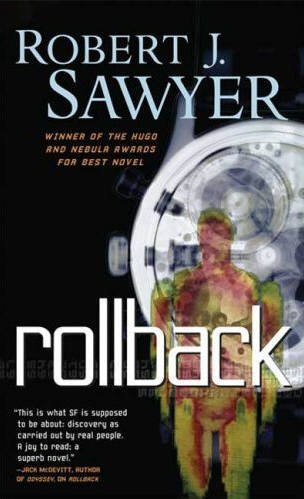On Canadian science fiction
by Rob - October 5th, 2011.Filed under: Canadian SF, Interviews.

I stumbled today across this by-email interview I did in March 2007 for an American librarian preparing an article about Canadian science fiction, and I thought I’d share it here.
(1) Do you believe that there is a significant difference between Canadian and American SF? If so, how would you describe that difference?
I like to quip that American SF has happy endings, Canadian SF has sad endings — and British SF has no endings at all. Seriously, I do think we Canadians are much more interested in writing realistic emotional denouements — which often are ambiguous and sometimes downbeat — rather than heroic triumphs.
(2) What would you say is particularly Canadian about your writing?
The easy answer is the setting: most of my books are set in Canada. But beyond that, there’s a Canadian sensibility to my books, perhaps best displayed in my Hugo Award-winning Hominids and its sequels. As compared to Americans, Canadians are more secular, more environmentally conscious, more willing to trade individual liberty for collective security, and more open to alternative lifestyles — and those are precisely the traits I gave my modern-day Neanderthal characters in those books.
(3) Is there any significant conversation between Anglophone and Francophone science fiction in Canada, or are these really two separate literatures with little in common?
We all know each other, and like each other, but the sad truth is that although Canada is an officially bilingual country, what that really means is that most French Canadians can also read and speak English; very few English Canadians are comfortable in French. It’s a national embarrassment and a failure of our otherwise quite good public-education system. So the Francophone writers certainly know the major English-language SF books, but the reverse just isn’t true.
The only French-Canadian writer widely translated into English is Elisabeth Vonarburg, who writes in a sort of Ursula K. LeGuin voice.
(4) Can you give me a brief description of your most recent (or, if you prefer, your most significant) book?
My seventeenth novel Rollback comes out in April 2007, and I think it’s probably the best example yet of what I try to do as an SF writer. My mission statement, if you will, is to combine the intimately human with the grandly cosmic.
Rollback‘s plot involves communicating with aliens via radio about what morals and ethics might transcend species boundaries — that’s the grandly cosmic part. The novel tells the story of Sarah Halifax, an 87-year-old radio astronomer who is involved with this project is offered a “rollback,” an experimental procedural that will make her young again — so that she can keep up the dialog with the aliens, which, because of the slowness of the speed-of-light, takes almost 40 years between messages.
She refuses to have the rollback unless her husband of 60 years gets one, too — and the procedure succeeds for him, and fails for her. That’s the intimately human part: the impact the suddenly huge disparity in physical ages has on her husband’s relationship with her, with their children, and so on.
To my delight, Publishers Weekly gave it a starred review, and Quill & Quire — the Canadian counterpart of PW said exactly what I was hoping reviewers would say, which is: “Sawyer handles the demands of the heart and the cosmos with equal skill” — which is precisely what good science fiction should do, in my opinion.

Robert J. Sawyer online:
Website • Facebook • Twitter • Newsgroup • Email


October 10th, 2011 at 12:10 am
I recently listened to Rollback (I have the Audible version) for what I believe was the third time. It’s one of my favorite sci-fi novels ever. You captured the pain of losing a soul mate in such fine detail that it hurts all over again every time I hear it–an exquisite sort of hurt that draws me back.
That story, along with Shed Skin, capture for me the inadvertent horrors of the coming singularity. I hope, in some future novel, you will tackle the disparity between the haves the have nots from a technological viewpoint. It’s not a new concept, of course, but it’s one we’re much closer to reaching than ever before in the history of man.
Thanks,
— david j.